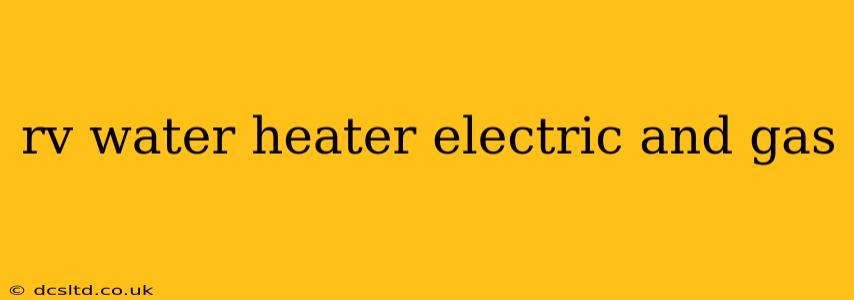Choosing the right water heater for your RV can significantly impact your comfort and camping experience. The two main types are electric and gas, each with its own set of advantages and disadvantages. This comprehensive guide will help you understand the key differences between electric and gas RV water heaters, enabling you to make an informed decision based on your specific needs and travel style.
Electric RV Water Heaters
Electric RV water heaters are generally smaller and lighter than their gas counterparts. They operate by converting electricity into heat to warm the water. This makes them a popular choice for RVers who frequently stay at campgrounds with readily available electrical hookups.
Pros:
- Quiet Operation: Electric heaters are significantly quieter than gas heaters, providing a peaceful camping experience.
- Easy Installation: Generally easier to install than gas water heaters, often requiring less plumbing expertise.
- Clean Energy Source: Utilizes readily available electricity, avoiding the need for propane tanks.
Cons:
- Slower Heating: Electric heaters tend to heat water more slowly compared to gas heaters.
- Dependence on Electricity: Requires a reliable electrical hookup; performance is limited or nonexistent without power.
- Higher Electricity Costs: Running an electric water heater can contribute to higher electricity bills, particularly during extended stays.
Gas RV Water Heaters
Gas RV water heaters use propane gas as their fuel source to heat water. They are generally more powerful than electric heaters, offering faster heating times. This makes them ideal for RVers who prioritize speed and convenience, particularly those who often boondock (camp off-grid).
Pros:
- Faster Heating: Gas heaters heat water much faster than electric heaters.
- Independence from Electricity: They can operate without an electrical hookup, making them suitable for off-grid camping.
- Efficient Heating: Propane is a relatively efficient fuel source for water heating.
Cons:
- Noisier Operation: Gas heaters tend to be noisier than electric heaters due to the burner ignition and operation.
- Propane Handling: Requires the handling and storage of propane tanks, which involves safety considerations.
- Ventilation Requirements: Adequate ventilation is crucial for safe gas heater operation.
How Much Hot Water Do I Need?
The amount of hot water you need depends on several factors, including the size of your RV, the number of occupants, and your showering habits. Larger RVs with multiple occupants will obviously require a water heater with a larger capacity. Consider your average daily hot water usage to determine the appropriate tank size.
What are the Different Types of RV Water Heaters?
While electric and gas are the primary fuel types, you'll also find variations within each category. Some RV water heaters feature:
- Tankless Water Heaters: These provide on-demand hot water, eliminating the need for a storage tank. Both gas and electric tankless options are available but are often more expensive initially.
- Direct Vent Water Heaters: These units vent exhaust gases directly to the outside, enhancing safety and reducing the risk of carbon monoxide buildup. This is a very important safety feature, especially for gas water heaters.
How Much Does an RV Water Heater Cost?
The cost of an RV water heater varies based on type, size, and features. Expect to pay more for larger capacity heaters, tankless models, and those with advanced features. Prices can range from a few hundred dollars to over a thousand dollars.
How Long Do RV Water Heaters Last?
The lifespan of an RV water heater depends on usage, maintenance, and the quality of the unit. With proper maintenance, a well-maintained RV water heater can last for 8-10 years or even longer.
Which is Better: Electric or Gas?
The "better" choice between electric and gas RV water heaters ultimately depends on your individual needs and priorities. If you primarily camp in locations with reliable electricity and prioritize quiet operation, an electric water heater might be the better choice. If you frequently boondock or require fast water heating, a gas water heater is likely a better fit. Consider your typical camping style, budget, and available resources to determine the most suitable option for your RV lifestyle.
